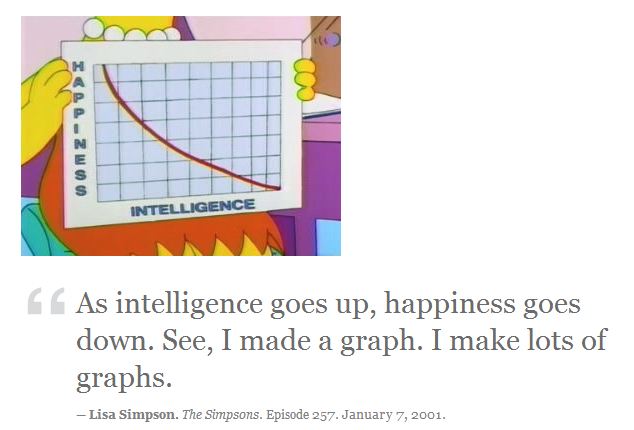There’s been debate for some time (some say started by Lisa Simpson in a 2001 Simpson episode) that smart people are not as happy as those with lower intelligence. If Lisa is correct, then can we jump to the conclusion that ignorance is bliss? Nobody knows. This hypothesis has yet to be tested. Even Freakonomics weighed in on this topic and claims it would make for a great dissertation. Yet we see leaders using this strategy often in organizations.

Let’s take an example frequently discussed in the media: CIOs being unaware that their departments are becoming less relevant to the rest of the business.
Consulting firms Gartner and Accenture have independently published reports showing the disconnect between CIOs and their C-level colleagues. Gartner research says half of surveyed business executives thought IT delivery needed to improve while only 10% of CIOs said they had a delivery problem. Some say that the rise of the job “Chief Digital Officer” is directly related to this dynamic. This position is filling the void created by an ‘ignorance is bliss’ belief system of many CIOs. According to The Economist, Gartner estimates that 5-6% of companies now have a Chief Digital Officer.
Is it better not to know what’s really going on in your department, in your organization? Better to stay above the fray and keep plugging along? It is really difficult to find a situation where problems just go away on their own. In the case of the CIO example, following a ‘ignorance is bliss’ policy will probably prove career-ending.
What’s a Smart Person To Do?
When a smart person (like you) becomes a leader or rises in the leadership ranks of your organization, there are times when you are on such a learning curve that you are clueless. Ignorance may be bliss — temporarily. But there are very few Forrest Gump successes in business. You will get quickly jolted to the uncomfortable place where you have to make a conscious decision to develop your Intellectual Health — deepen your curiosity, broaden your adaptive mindset and use paradoxical thinking — or pretend there’s no problem or it doesn’t apply to you.
Inevitably in our technical workplaces, you are going to work with people who are smarter or know more than you. But Grounded leaders learn how to push themselves to develop. They see it as part of their job and critical to their success. Ignorance is bliss is not a strategy any leader should bank on.
Avoiding Ignorance is Bliss
Make haste slowly. Hands down, learning is the best way to embrace change. You won’t feel confident or less anxious, until you develop your knowledge and skill as a leader. Learning doesn’t happen overnight. It takes a bit of time. Small steps lead to big changes.
How you think about things creates the framework for how you will respond. It’s the “is the glass half empty or half full?” dilemma. To move forward, to make changes, opting for optimism (the glass is half full) will make the journey easier.
Check that you don’t get caught in the activity trap where you feel compelled to take lots of action or create lots of activity so you feel like you are doing something but end up with little or no results.
Practice thinking in web-like ways, not in linear ways. Look for and identify multi-dimensional and multi-directional connections. Commit to developing your Intellectual Health.
How is your Intellectual Health? Find out by taking the Healthy Leader Assessment.



